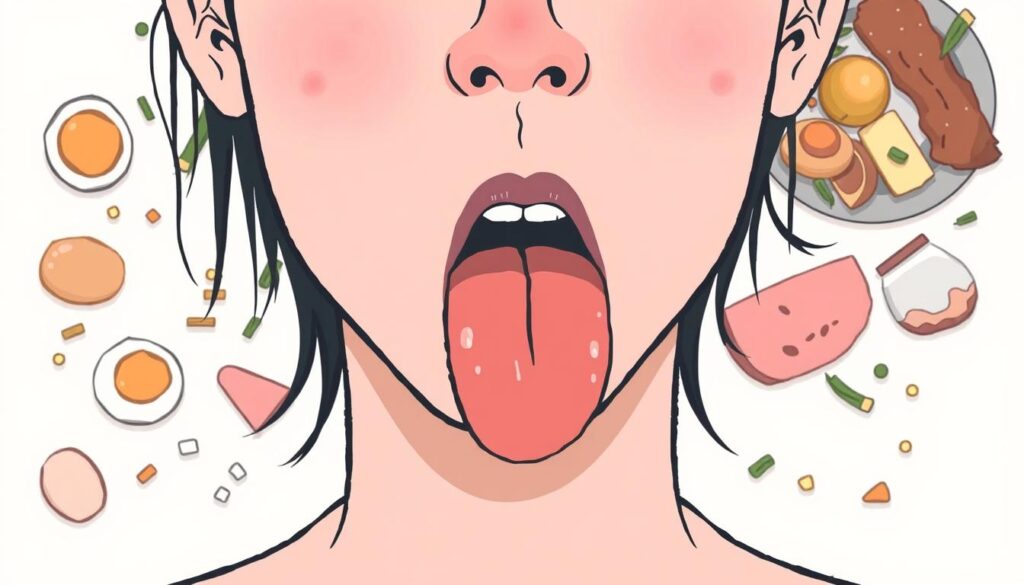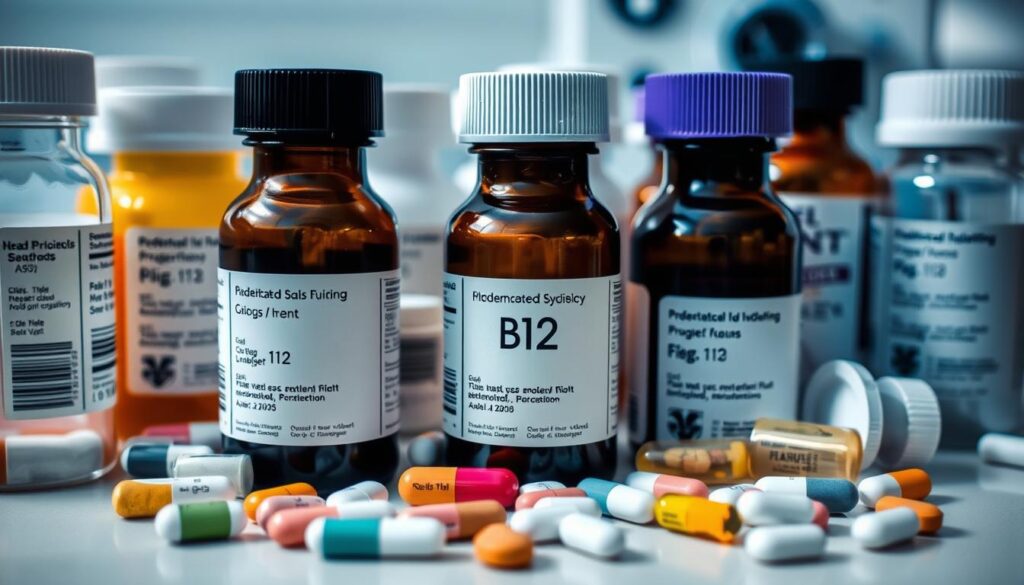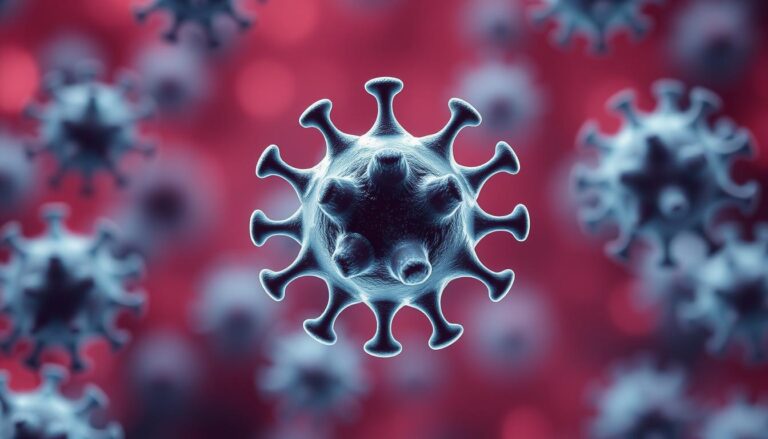Feeling tired, having brain fog or noticing changes in your skin and hair? These could be signs of a vitamin B12 deficiency.
Vitamin B12 is key for making red blood cells, DNA, and keeping your nervous system working right. But many people don’t know they’re missing this important vitamin leading to serious symptoms.
Key Takeaways
- Vitamin B12 deficiency can cause a wide range of symptoms, including fatigue, brain fog, and changes in skin and hair.
- Certain groups, such as the elderly, vegans, and individuals with gastrointestinal conditions, are at a higher risk of B12 deficiency.
- Recognizing the early signs of B12 deficiency is important for seeking prompt medical attention and preventing potential long-term complications.
- Maintaining adequate B12 levels through diet and supplementation, when necessary, is crucial for overall health and well-being.
- Consulting with a healthcare professional is recommended to accurately diagnose and effectively manage any B12 deficiency.
What is Vitamin B12?
Vitamin B12, also known as cobalamin, is a water-soluble vitamin. The human body can’t make it on its own. It must get it from food or supplements. This vitamin is key for making DNA, red blood cells, and helping the nervous system grow.
Functions and Sources of Vitamin B12
Vitamin B12 is vital for many body functions. It helps make red blood cells, which carry oxygen. It also keeps nerves healthy and aids in breaking down proteins, fats, and carbs. Animal-based foods like meat, fish, poultry, eggs, and dairy are the main sources of vitamin B12.
| Vitamin B12 Functions | Vitamin B12 Sources |
|---|---|
|
|
Getting enough vitamin B12 is crucial for health. Knowing its roles and where to find it helps meet daily needs.
Signs of B12 Deficiency: Blood and Bone Health
One of the most well-known signs of b12 deficiencyanemia is anemia. This is when you don’t have enough healthy red blood cells. It can make you feel tired, weak, and your skin might look pale.
Also, b12 deficiency osteoporosis can increase your risk of osteoporosis and bone fractures. Vitamin B12 is key for bone health.
Anemia and Osteoporosis Risk
Anemia is a common sign of b12 deficiency blood health. It happens when your body can’t carry enough oxygen. This leads to feeling tired, weak, and looking pale.
Research also links vitamin B12 deficiency to a higher risk of osteoporosis and bone fractures. Vitamin B12 is important for bone structure and health.
- Anemia is a condition characterized by a lack of healthy red blood cells, a common sign of B12 deficiency
- B12 deficiency can increase the risk of osteoporosis and bone fractures, as the vitamin is necessary for proper bone health
- Symptoms of B12 deficiency-related anemia include fatigue, weakness, and pale skin
Approximately 1–2% of anemia cases in the general population are due to B12 deficiency.

It’s crucial to catch b12 deficiency anemia and b12 deficiency osteoporosis early. This helps prevent serious problems and keeps you healthy. Regular check-ups and blood tests can spot vitamin B12 deficiency early.
Vision and Neurological Symptoms
Vitamin B12 deficiency can affect both vision and the nervous system. A rare condition linked to B12 deficiency is optic neuropathy. This damages the optic nerve, leading to vision loss or blind spots.
B12 deficiency also causes neurological symptoms. These include memory issues, cognitive problems, and a higher risk of Alzheimer’s or stroke. In fact, a study found that 38 children with neurological symptoms like syncope, dizziness, and fatigue were all diagnosed with B12 deficiency.
| Neurological Symptoms of B12 Deficiency | Prevalence |
|---|---|
| Syncope fainting | 6 cases |
| Dizziness | 4 cases |
| Hypotonia muscle weakness | 9 cases |
| Convulsions | 4 cases |
| Hand tremor | 1 case |
| Tingling and paresthesia | 3 cases |
| Vision blurring | 1 case |
| Fatigue and concentration difficulty | 8 cases |
The study showed that all patients with these symptoms got better within a month after B12 treatment. This highlights how important B12 is for vision and brain health.
What are the signs of lacking B12?
A lack of vitamin B12 can cause many problems. One big sign is persistent fatigue and not having enough energy. People with B12 deficiency fatigue might feel tired all the time, even after sleeping well. B12 deficiency depression is also common, as B12 helps keep our minds healthy and sharp.
Those without enough B12 might also feel depleted and low in mood. They might have trouble remembering things, focusing, and making decisions. These brain problems can really hurt how well someone lives and feels.
Fatigue Depression and Cognitive Issues
- Persistent fatigue and lack of energy
- Feelings of depression and low mood
- Cognitive challenges, such as memory lapses and trouble concentrating
It’s very important to deal with signs of b12 deficiency and symptoms of b12 deficiency. Recognizing these signs early and getting help is key to staying healthy and feeling good. By acting fast, people can fix their B12 levels and feel better mentally and physically.

B12 deficiency can have a significant impact on both physical and mental health. Addressing these issues promptly is crucial for preventing further complications.
Skin Hair and Nail Problems
Vitamin B12 deficiency can cause many skin, hair, and nail issues. It can lead to hyperpigmentation, vitiligo, and changes in nail color and texture. This imbalance can greatly affect how we look.
Research shows that up to 41% of people with B12 deficiency have skin and mucosal changes. They might see hyperpigmented macular lesions on their feet or nonpigmented skin lesions on their neck and limbs. These skin problems often get better quickly with B12 treatment, showing how important early action is.
B12 deficiency can also cause hair loss and nail health issues. Signs include brittle peeling, or discolored nails. Vertical ridges, horizontal lines, and missing half-moons at the nail base can also indicate a B12 problem.
Eating a balanced diet with B12-rich foods like meat eggs, and dairy is key to avoiding these problems. Vegetarians, vegans, and the elderly should watch their B12 levels closely. If they notice any concerning symptoms, they should see a doctor right away.
| Skin Condition | Description | Link to B12 Deficiency |
|---|---|---|
| Hyperpigmentation | Dark spots or patches on the skin | Commonly observed in B12 deficiency |
| Vitiligo | Patchy loss of skin pigmentation | Associated with B12 deficiency |
| Mouth Ulcers | Painful sores in the mouth | Can be a symptom of B12 deficiency |
| Eczema | Chronic, inflammatory skin condition | May worsen with B12 deficiency |
| Acne | Breakouts of pimples, blackheads, and cysts | Linked to B12 deficiency in some cases |
Fixing b12 deficiency skin problems, b12 deficiency hair loss, and b12 deficiency nail problems with the right diet and treatment can make us look healthy and vibrant again.
Recommended Dietary Intake Levels
Keeping vitamin B12 levels right is key for good health. The amount you need changes with age. Babies need 0.4-0.5 micrograms mcg of B12. Kids and teens should get 0.9-2.4 mcg.
Adults need 2.4 mcg every day. Pregnant and nursing moms should aim for 2.6 to 2.8 mcg.
Food Sources of Vitamin B12
Animal-based foods are the top sources of B12. This includes meat, fish, poultry, eggs, and dairy. If you don’t eat these, fortified foods like cereals and plant milks are good options.
It’s important to know how much B12 you need. This can change based on your health. Always talk to a doctor to find out the right amount for you.
- Meat beef, pork, lamb
- Seafood salmon, tuna, trout, shellfish
- Poultry chicken, turkey
- Eggs
- Dairy products milk, cheese, yogurt
- Fortified cereals and plant-based milks
Eating these foods can help you get enough B12. This supports your health and well-being.

Risk Factors for B12 Deficiency
Some people are more likely to have a vitamin B12 deficiency. The main reason is pernicious anemia, an autoimmune disease that stops the body from absorbing B12. Those with intestinal problems like Crohn’s disease, celiac disease, and atrophic gastritis also face a higher risk of B12 deficiency.
Drinking too much alcohol and taking certain medicines can also lead to B12 deficiency. Older adults, especially those over 75, are more likely to have B12 deficiency and folate deficiency. People between 65 and 74 are also at risk, but less so.
Pernicious Anemia and Malabsorption
Pernicious anemia is a major cause of vitamin B12 deficiency in the UK. Vegans and those eating poorly for a long time can also get B12 deficiency because of their diet.
Stomach problems, stomach surgeries, and diseases like Crohn’s can make it hard for the body to absorb vitamin B12. This leads to malabsorption-related B12 deficiency.
| Risk Factor | Prevalence |
|---|---|
| Pernicious Anemia | Leading cause of B12 deficiency in the UK |
| Vegan/Poor Diet | Can lead to B12 deficiency due to dietary factors |
| Stomach Conditions | Can hinder B12 absorption |
| Certain Medications | Proton pump inhibitors can impair B12 absorption |
| Older Adults | 1 in 10 aged 75+ affected by B12 or folate deficiency |
It’s important to address risk factors for B12 deficiency, like pernicious anemia and malabsorption. Doing so helps keep health in check and prevents serious problems.
Medication Interactions and Other Causes
Some medications can cause vitamin B12 deficiency. These include proton pump inhibitors, H2 blockers, metformin, colchicine, and some chemotherapy drugs. Age and weight loss surgery can also affect B12 levels by making it harder to absorb.
Vegetarians and vegans are more likely to have B12 deficiency because plant-based foods lack it. Adults need 2.4 micrograms of vitamin B12 daily. However, taking B12 with folic acid and vitamin B6 does not lower the risk of heart disease and stroke.
Too much vitamin B12 can cause side effects like headaches and nausea. It can also interact with certain drugs, making it harder to absorb.
Oral vitamin B12 supplements are safe and well-absorbed. Any extra is passed in urine. Low levels of B12 in the blood or high MMA levels suggest a deficiency.

Adults need 2.4 to 2.8 mcg of vitamin B12 daily, especially during breastfeeding. The average B12 in breast milk is 0.44 mcg/L for women with high intake. Different foods have varying amounts of B12, like 70.7 mcg in beef liver and 8.3 to 24 mcg in fortified nutritional yeasts.
Multivitamin/mineral supplements have 5 to 25 mcg of vitamin B12. Supplements absorb about 50% of doses under 1-2 mcg. But, absorption drops to 2% at 500 mcg and 1.3% at 1,000 mcg. There’s no difference in absorption between different B12 forms in supplements.
Diagnosing B12 Deficiency
If doctors think you might have a vitamin B12 deficiency, they’ll usually ask for a blood test. This test checks your B12 levels. It helps confirm if you have a deficiency and what treatment you need. They might also look at your symptoms, medical history, and risk factors for B12 deficiency.
Blood Tests and Clinical Evaluation
A vitamin B12 blood test gives important information about your B12 levels. If your level is less than 200 pg/mL, it’s considered deficient. Doctors also look for intrinsic factor antibodies, which can show pernicious anemia, a common B12 deficiency cause.
Doctors will also do a clinical evaluation. They’ll look at your medical history, symptoms, and risk factors. This includes a vegan or vegetarian diet, gastrointestinal disorders, or advanced age. This helps them make an accurate diagnosis and plan the right treatment.
Diagnosing a B12 deficiency is key to treating it and avoiding health risks like anemia and neurological complications. By working with your doctor and getting the right blood tests and clinical evaluation, you can start improving your health.
Treatment Options for B12 Deficiency
When a vitamin B12 deficiency is found, several treatments can help. Oral B12 supplements are a common choice. They can be taken alone or as part of a B-complex or multivitamin. For serious cases, B12 injections might be needed. These are given daily for two weeks and then less often to keep levels up.
Changing your diet can also help. Eating more foods rich in B12 is a good idea. Beef, poultry, fish, eggs, and dairy are all good sources.
Supplements, Injections, and Diet Changes
The right treatment depends on how bad the B12 deficiency is and why it happened. People with severe cases or trouble absorbing B12 might need B12 injections. Those with mild cases might just need supplements or to eat more B12-rich foods.
It’s key to work with a doctor to manage the deficiency. They will check your progress and make sure your B12 levels are okay. You might need blood tests to keep an eye on your B12 levels.
The key to effectively treating B12 deficiency is to address the underlying cause, whether it’s through dietary changes, supplements, or medical interventions.
Conclusion
Vitamin B12 deficiency is common and can be treated. It affects health and well-being. Recognizing signs like fatigue and skin issues is key.
Seeking medical help is important. Working with doctors helps find and fix the problem. This ensures you get the right treatment.
Keeping vitamin B12 levels right is vital for health. The conclusion b12 deficiency shows the need for regular health checks. It also highlights the importance of diet and supplements.
Knowing about vitamin B12 and its role is crucial. It helps avoid health problems. Taking care of your health through education and lifestyle changes is essential.
By understanding and acting on vitamin B12 needs, you can stay healthy. This approach helps manage conclusion b12 deficiency. It ensures a better life quality.
FAQ
What are the signs and symptoms of vitamin B12 deficiency?
What are the main functions and dietary sources of vitamin B12?
How can vitamin B12 deficiency impact blood and bone health?
What are the neurological and vision related symptoms of B12 deficiency?
What are the recommended dietary intake levels for vitamin B12?
What are the risk factors for developing a vitamin B12 deficiency?
How is a vitamin B12 deficiency diagnosed and treated?





